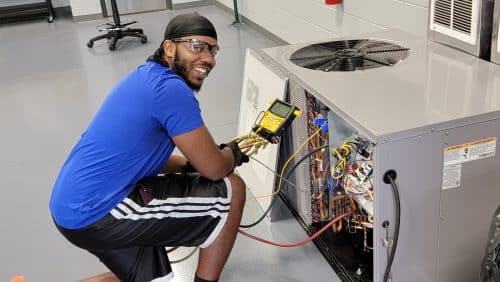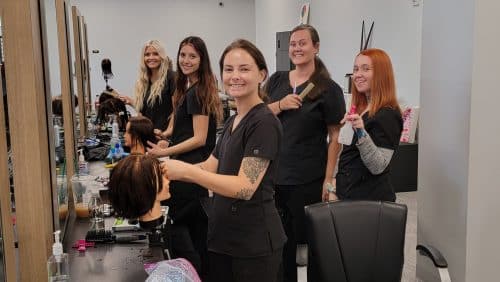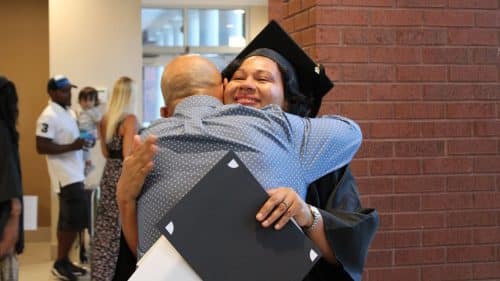
KnightCare FAQ
Home > KnightCARE > KnightCare FAQ
KnightCare FAQ
KnightCARE stands for Campus Awareness Response and Evaluation. WGTC’s KnightCARE is a multidisciplinary team that helps identify members of the WGTC community who may be struggling or at risk in order to provide timely and appropriate interventions to assist them.
KnightCARE handles a range of issues, including:
- mental health concerns
- threatening or violent behaviors
- substance use issues
- suicide risk or suicidal ideation
- stalking or sexual harassment concerns
- relationship problems affecting school or work
Members of the WGTC community can share concerns about students, faculty, staff members or themselves by filling out a KnightCARE concern form.
The KnightCARE team responds immediately to all concerns by evaluating needs and risk levels on a case-by-case basis. Then the team implements a timely intervention to help WGTC students and staff access the specific resources they need as quickly as possible.
- Assist WGTC faculty, staff and students in identifying behaviors that signal an individual who may be distressed, disruptive, and/or dysregulated and therefore pose a potential risk to self or others
- Protect the WGTC community in cases of imminent threats of harm to self and/or others
- Identify resources for troubled students and personnel and provide active referrals to appropriate WGTC departments and off-campus agencies
- Centralize the process of collecting and assessing concerns as they are documented by different sources within the college before a crisis
- Provide structured guidance and support for any member of the campus community who reports disruptive and/or problematic behaviors that might lead to aggression or self-harm
- Develop a coordinated plan to help a student or staff member in crisis in order to mitigate risk, facilitate early intervention, and protect and maintain campus safety
- Coordinate follow-up with the student and/or staff member to ensure that recommended services, support, and resources are deployed effectively
- Balance FERPA, HIPAA, and individual privacy concerns with WGTC’s need-to-know and emergency communication needs
WGTC’s KnightCARE helps identify members of the WGTC community who may be struggling or at risk in order to provide timely and appropriate interventions to assist them. The team also helps faculty, staff and students in situations involving distressed, disruptive, or threatening behavior.
KnightCARE:
- Responds to reports by formally assessing whether a person poses a risk to self or others
- Investigates each situation and recommends interventions from within the college such as Accessibility Services, Student Affairs, Human Resources or WGTC Police
- Identifies resources for troubled students and personnel and provides active referrals to appropriate off-campus agencies
- Regularly reviews outcomes of actions taken by the KnightCARE team to ensure that the proper actions have been taken to address each situation effectively
KnightCARE does not adjudicate, discipline or impose sanctions against any member of the campus community, nor does it provide or mandate treatment and, therefore, is not a disciplinary body.
People experiencing psychological or emotional distress may not directly express their feelings, but they will usually exhibit behaviors that are out of the ordinary and/or considered socially inappropriate or strange. Use of drugs or alcohol may mirror or exacerbate these symptoms.
Individuals who are in distress are at greater risk of suicide, especially when behaviors are new or have increased, often in response to a recent painful event, including loss or changes.
Examples of Distressed Behavior
- Escalating anger or aggressive behavior
- Noticeable changes in behavior or appearance
- Expressions of suicidal thoughts
- Writing about violence or weapons
- Social media posts with alarming content
- Erratic behavior
- Stalking and harassing behavior
- Increased depression
- Increased drug use
- Threats of domestic violence
- Paranoid behavior
- Cutting off communications
- Inappropriate or exaggerated emotional responses to a given situation including lack of emotional response to a stressful situation
- Significant decline in academic performance (Frequent attempts to obtain postponement of tests or extensions on assignments that are due)
- Observable or disturbing change in interaction patterns (when it is linked with other concerning behaviors)
- Repeated or excessive classroom disruptions (hostile or antagonistic behaviors)
- Extreme rudeness or insubordination to college officials, staff, faculty, or administrators
- Intoxication or being under the influence of illicit drugs on campus property
- Threatening words or actions (directly threatening other students or staff)
- Writings that convey clear intentions to harm self or others (in academic assignments or on social media)
- Observed self-injurious behavior, such as cutting, burning, eating disorders, etc.
- Online postings in social media such as Facebook, Instagram, SnapChat, blogs, websites, e-portfolios, class journals, etc. that display distress or danger
- Suicidal behavior, including threats (“I am going to kill myself”), gestures (pointing a finger to the head to indicate shooting) expressions of suicidal ideation (“I’ve always thought about killing myself by taking pills”), or documented suicide attempts
- Acts or overt expressions motivated by hatred or discrimination
- Paranoia or delusion (a student groundlessly believes they are being targeted)
- Stalking a staff member or another student
- Intimate partner violence
Before submitting a concern, faculty, staff and students may consult with a member of the KnightCARE team to discuss their concern. However, completing a report form may still be required following the consultation.
The person who submits the information will receive an acknowledgment from the KnightCARE team confirming the appropriate response has been or is being made.
- Faculty and staff submitting a report should not expect detailed information about the disposition of their submission because the issue may involve due process or confidentiality rights of the student.
- Faculty and staff should submit additional reports as new concerns arise or as behavior is repeated, even if they have done so before. A single incident may be insufficient to take action, but a pattern of incidents may require an institutional response.
A person in distress has a right to privacy. In most situations, information provided by the person reporting a concern is confidential and is only released with that person’s permission.
Written records, including student conduct reports, are protected by the Family Education Rights and Privacy Act (FERPA). Except in extraordinary circumstances, permission to release this information is to be given by the student in writing.
FERPA does permit the release of information when necessary to protect the health or safety of the student or others.
When a person presents an imminent danger to self or others, it is both permissible and crucial to notify the WGTC Campus Police (and/or call 911) and the student’s emergency contact.






